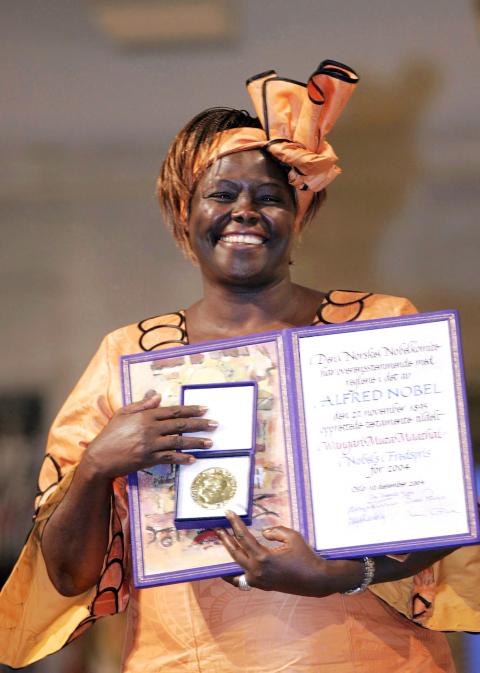Wangari Maathai, the first African woman recipient of the Nobel Peace Prize, died after a long struggle with cancer, the environmental organization she founded said yesterday. She was 71.
One of Kenya’s most recognizable women, Maathai won the Nobel in 2004 for combining environmentalism and social activism. She was the founder of the Green Belt Movement, where for more than 30 years she mobilized poor women to plant 30 million trees.
Edward Wageni, that group’s deputy executive director, said Maathai died in a Nairobi hospital late on Sunday. Maathai was in and out of the hospital since the beginning of the year, he said.

Photo: EPA
In recognizing Maathai, the Nobel committee said that she had stood up to a former oppressive regime in Kenya and that her “unique forms of action have contributed to drawing attention to political oppression.” Maathai said during her 2004 acceptance speech that the inspiration for her life work came from her childhood experiences in rural Kenya, where she witnessed forests being cleared and replaced by commercial plantations, which destroyed biodiversity and the capacity of forests to conserve water.
Although the Green Belt Movement’s tree planting campaign did not initially address the issues of peace and democracy, Maathai said it become clear over time that responsible governance of the environment was not possible without democracy.
“Therefore, the tree became a symbol for the democratic struggle in Kenya. Citizens were mobilized to challenge widespread abuses of power, corruption and environmental mismanagement,” Maathai said.
Tributes poured out for Maathai online, including from Kenyans who remember planting trees alongside her as schoolchildren. One popular posting on Twitter noted that Maathai’s knees always seemed to be dirty from showing VIPs how to plant trees.
A long time friend and fellow professor at the University of Nairobi, Vertistine Mbaya, said that Maathai showed the world how important it is to have and demonstrate courage.
“The values she had for justice and civil liberties and what she believed were the obligations of civil society and government,” Mbaya said. “She also demonstrated the importance of recognizing the contributions that women can make and allowing them the open space to do so.”
Maathai was the first woman to earn a doctorate in East Africa — in 1971 from the University of Nairobi, where she later was an associate professor in the department of veterinary anatomy. She previously earned degrees from Mount St Scholastica College in Atchison, Kansas, and the University of Pittsburgh.
She also headed the Kenya Red Cross in the 1970s. She was elected a member of parliament in 2002 and then named the environment assistant minister, a position she held between 2003 and 2005.
Maathai is survived by her three children.

The collapse of the Swiss Birch glacier serves as a chilling warning of the escalating dangers faced by communities worldwide living under the shadow of fragile ice, particularly in Asia, experts said. Footage of the collapse on Wednesday showed a huge cloud of ice and rubble hurtling down the mountainside into the hamlet of Blatten. Swiss Development Cooperation disaster risk reduction adviser Ali Neumann said that while the role of climate change in the case of Blatten “still needs to be investigated,” the wider impacts were clear on the cryosphere — the part of the world covered by frozen water. “Climate change and

Poland is set to hold a presidential runoff election today between two candidates offering starkly different visions for the country’s future. The winner would succeed Polish President Andrzej Duda, a conservative who is finishing his second and final term. The outcome would determine whether Poland embraces a nationalist populist trajectory or pivots more fully toward liberal, pro-European policies. An exit poll by Ipsos would be released when polls close today at 9pm local time, with a margin of error of plus or minus 2 percentage points. Final results are expected tomorrow. Whoever wins can be expected to either help or hinder the

DENIAL: Musk said that the ‘New York Times was lying their ass off,’ after it reported he used so much drugs that he developed bladder problems Elon Musk on Saturday denied a report that he used ketamine and other drugs extensively last year on the US presidential campaign trail. The New York Times on Friday reported that the billionaire adviser to US President Donald Trump used so much ketamine, a powerful anesthetic, that he developed bladder problems. The newspaper said the world’s richest person also took ecstasy and mushrooms, and traveled with a pill box last year, adding that it was not known whether Musk also took drugs while heading the so-called US Department of Government Efficiency (DOGE) after Trump took power in January. In a

It turns out that looming collision between our Milky Way and Andromeda galaxies might not happen after all. Astronomers on Monday said that the probability of the two spiral galaxies colliding is less than previously thought, with a 50-50 chance within the next 10 billion years. That is essentially a coin flip, but still better odds than previous estimates and farther out in time. “As it stands, proclamations of the impending demise of our galaxy seem greatly exaggerated,” the Finnish-led team wrote in a study appearing in Nature Astronomy. While good news for the Milky Way galaxy, the latest forecast might be moot